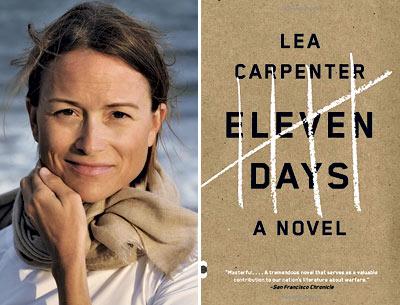Anatomy of a Warrior

“Eleven Days”
Lea Carpenter
Vintage Contemporaries, $15.95
Lea Carpenter’s novel, “Eleven Days,” is the story of a single mother, Sara, and her son, Jason, a member of this nation’s class of elite warriors. It’s about the 11 days of reflection and angst she suffers while waiting to find out what has happened to her only child, who went missing during a mission that coincided with the one that brought down Osama bin Laden.
Jason is a graduate of the Naval Academy who went on to endure the grinding physical and mental trials required to become a Navy SEAL. As we all know, it was a SEAL team that brought down Osama bin Laden, one of our Special Operations Forces that now participate in what the author terms the “military equivalent of grand master chess games” that the worldwide balance of power has become.
Jason’s father was/is a C.I.A. spook operating at the highest and most secret levels of government. If I told you any more about him it would ruin this fine book and I’d have to kill you.
Ms. Carpenter is an excellent storyteller, but there are quite a few of those. What places her apart is the depth of her research about Special Forces training and ops, and about the arcane workings of Washington, D.C., the mind-set and all-but-predestined, Ivy League career paths of policy makers whose white papers Sara is paid to edit.
Of course, the emotional heart of “Eleven Days” beats to the dispirited tempos of a mother’s love, pride, and fear for her son. On an intellectual level, the author muses on the difference between Aristotle’s “phronesis,” wisdom learned from action that allows one to make choices about what to do in a given situation, and “sophia,” wisdom gained from books.
“Phronesis was less for scholars than for soldiers. And what Sara learned over time was that each division of the military had its own, even if slight, variation on the larger code and culture of the overall enterprise. The [SEAL] Teams had very strict code. Part of it was from their training. Part of it is soldered in the fight. Her son had elected to join the military when there was a major fight on.”
It is this phronesis/sophia business that’s kept me cogitating for days after finishing the book. Ms. Carpenter explores in her son the anatomy of a warrior, the irony of the soldier-poet, the extreme training that builds the determination, skill, and bravery of the kind that inspired the story of the original Jason and his challenging search for the Golden Fleece with his Argonaut comrades in arms.
“The most interesting people are the people we don’t know,” Sara is told by the father of an Academy classmate of Jason’s. “And she thought: The bravest people are the people we do not know.”
This, of course, is as troubling as it is probably true. There can be no doubt that in this post-9/11 world an elite warrior class is necessary. The chronic warfare we are engaged in requires it.
But, in telling the story of a mother and her warrior son, the author exposes, like a dark shadow, the great spiritual risk of putting all of one’s eggs in the hidden phronesis basket.
When all that youth, skill, brilliant physical prowess, comradeship, patriotism, and bravery can be destroyed in an instant, as happens to members of Jason’s team, the circumstances that make up that instant raise the most important questions for scholars, policy makers, and for all of us. Or, it should.
“If it be now, ’tis not to come;
If it be not to come, it will be now.
If it be not now, yet it will come:
The readiness is all.”
The quote from “Hamlet” (the “it” being the “fall of a sparrow,” a k a death) is from a letter, the most important letter, Jason sends to his mother, along with his Trident, the SEAL team insignia.
Ms. Carpenter gives us a peek at the motivation that drives the people who are fighting in Afghanistan and elsewhere in ways so much different from wars past. Her telling is inspiring, although this reviewer would have liked it if she had brought her subjects down off the frieze a little more often. This is by no means a fatal flaw in the total scope of this page-turner with a twist.
Lea Carpenter spends summers in Southampton. “Eleven Days” is now out in paperback.
